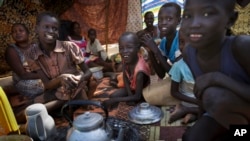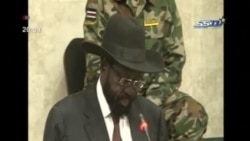Delegates for South Sudan's warring sides have gathered in Ethiopia for peace talks, following weeks of violence that has left more than 1,000 people dead.
Representatives of President Salva Kiir and rebel leader Riek Machar arrived in the capital, Addis Ababa, Wednesday. VOA reporter Marthe van der Wolf, who has talked to the delegates, says talks will begin Thursday at the earliest.
There were renewed clashes Wednesday between government troops and forces loyal to Machar in Bor, the capital of South Sudan's Jonglei state. In a Twitter message, the government said its forces had partially withdrawn from Bor, but there still was fighting in the suburbs.
Watch related video from VOA:
President Kiir declared a state of emergency in Jonglei state as well as the oil-producing Unity state.
The bloodshed in the world's newest country began in mid-December when Kiir accused his former vice president Machar of attempting a coup.
Machar told VOA's South Sudan in Focus Wednesday that President Kiir was responsible for much of the unrest, and peace can not be achieved under Kiir's leadership. (listen to the full interview below)
"He has disunited the country," said Machar. "There is a massacre in Juba, 'ethnic cleansing' in Juba. I don't think Salva Kiir can unite the people anymore."
Machar said South Sudan's citizens should join him in a bid to force the president to step down, if he does not do so voluntarily.
"I hope they will join the SPLM [ruling Sudan People's Liberation Movement] and the SPLA [ Sudan People's Liberation Army] in an uprising to force Salva Kiir to resign," Machar said.
Machar again called for the government to release his political allies who were jailed in the early days of the crisis. He said the political leaders need to be part of the talks in Ethiopia.
The peace talks in Addis Ababa are being brokered by IGAD [the Intergovernmental Authority on Development], an East African regional bloc.
The United Nations says the violence in South Sudan has forced more than 180,000 people from their homes.
Witnesses say some of the violence is ethnically motivated, with supporters of Kiir, a member of the Dinka tribe, and supporters of Machar, from the Nuer tribe, targeting each other because of their background.
Listen to our full interview with Riek Machar conducted by John Tanza:
Representatives of President Salva Kiir and rebel leader Riek Machar arrived in the capital, Addis Ababa, Wednesday. VOA reporter Marthe van der Wolf, who has talked to the delegates, says talks will begin Thursday at the earliest.
There were renewed clashes Wednesday between government troops and forces loyal to Machar in Bor, the capital of South Sudan's Jonglei state. In a Twitter message, the government said its forces had partially withdrawn from Bor, but there still was fighting in the suburbs.
Watch related video from VOA:
President Kiir declared a state of emergency in Jonglei state as well as the oil-producing Unity state.
The bloodshed in the world's newest country began in mid-December when Kiir accused his former vice president Machar of attempting a coup.
Machar told VOA's South Sudan in Focus Wednesday that President Kiir was responsible for much of the unrest, and peace can not be achieved under Kiir's leadership. (listen to the full interview below)
"He has disunited the country," said Machar. "There is a massacre in Juba, 'ethnic cleansing' in Juba. I don't think Salva Kiir can unite the people anymore."
Machar said South Sudan's citizens should join him in a bid to force the president to step down, if he does not do so voluntarily.
"I hope they will join the SPLM [ruling Sudan People's Liberation Movement] and the SPLA [ Sudan People's Liberation Army] in an uprising to force Salva Kiir to resign," Machar said.
Machar again called for the government to release his political allies who were jailed in the early days of the crisis. He said the political leaders need to be part of the talks in Ethiopia.
The peace talks in Addis Ababa are being brokered by IGAD [the Intergovernmental Authority on Development], an East African regional bloc.
The United Nations says the violence in South Sudan has forced more than 180,000 people from their homes.
Witnesses say some of the violence is ethnically motivated, with supporters of Kiir, a member of the Dinka tribe, and supporters of Machar, from the Nuer tribe, targeting each other because of their background.
Listen to our full interview with Riek Machar conducted by John Tanza:







